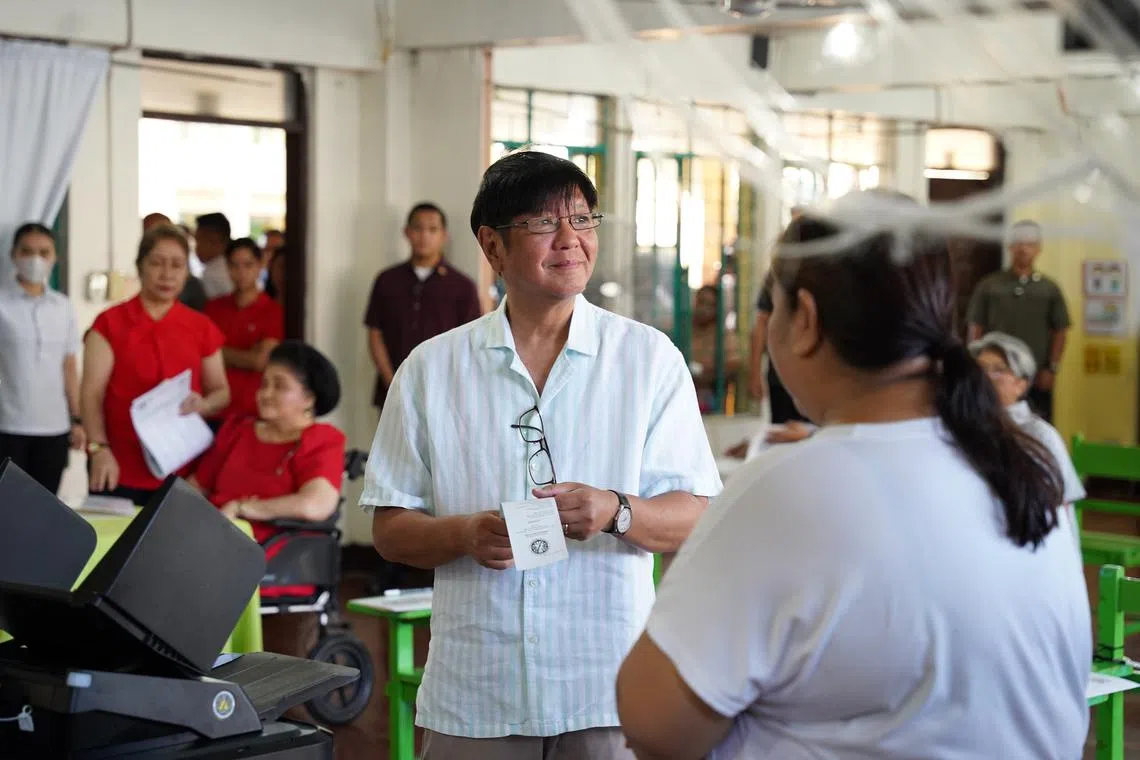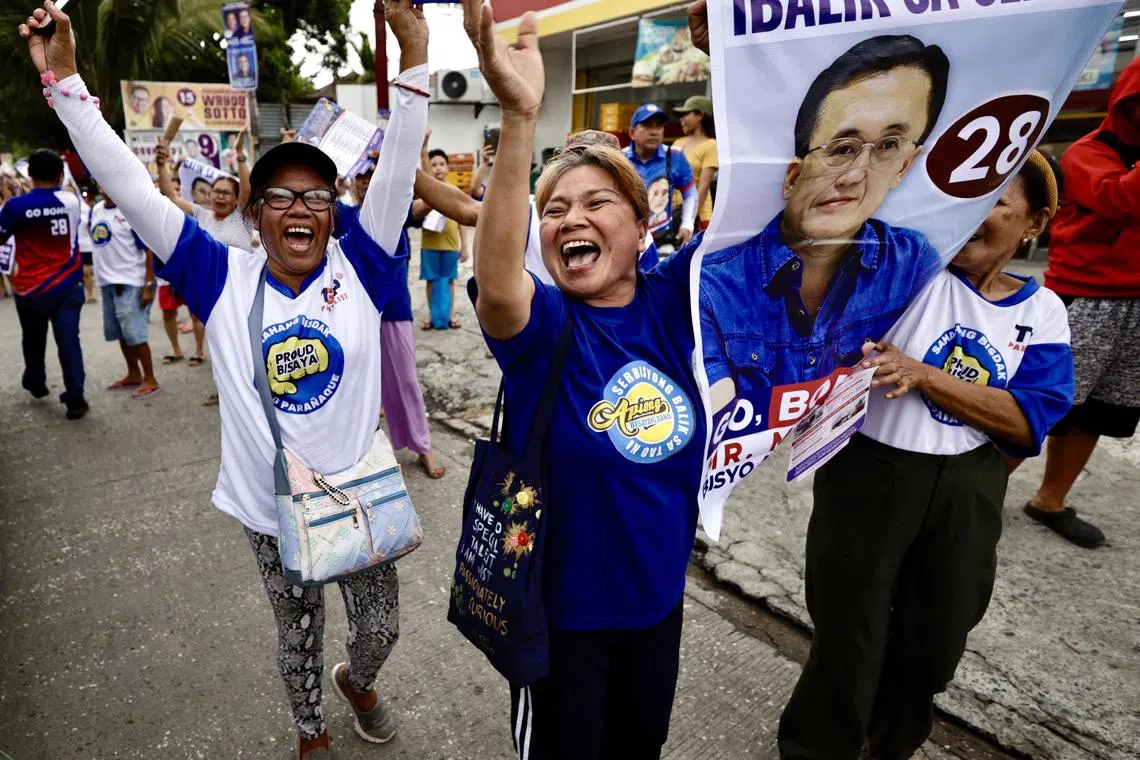Marcos’ grip on power shaken as Duterte allies, opposition surge in Philippines midterm polls
Sign up now: Get insights on Asia's fast-moving developments
Follow topic:
MANILA – Voters dealt President Ferdinand Marcos Jr a stinging blow in the Philippines’ midterm elections that weakened his grip on the Senate, while boosting Vice-President Sara Duterte’s allies just weeks before an impeachment trial against his deputy.
Early results also showed independent opposition candidates performing stronger than expected in the May 12 polls.
Some 68.43 million voters went to the polls
Unofficial results as at 5.02am on May 13, covering 80.26 per cent of the votes, showed Mr Marcos’ Alyansa Para sa Bagong Pilipinas (Alliance for a New Philippines) slate winning only six of the 12 contested Senate seats – well below the nine predicted in pre-election surveys.
Ms Duterte’s slate picked up five seats. Mr Bong Go, a longtime aide to her father, former president Rodrigo Duterte, has clinched 21.72 million votes so far – the most number of votes among the candidates vying for one of 12 contested Senate seats.
One Senate seat was claimed by a candidate endorsed by both factions: Ms Camille Villar, daughter of Filipino billionaire Manny Villar, who remained on Mr Marcos’ slate but aired campaign ads with Ms Duterte in the final stretch of the campaign. As the votes were tallied, Ms Villar was counted under both Mr Marcos’ and Ms Duterte’s victories.
But the strongest rebuke to the political status quo came from outside the Marcos-Duterte camps.
Opposition candidates critical of both factions made an unexpected breakthrough. Former senator Bam Aquino is placing second with 16.8 million votes in the Senate race, while former vice-presidential contender and senator Kiko Pangilinan is fifth with 12.3 million – both outperforming their pre-election survey rankings.
“This is a protest vote against the Marcos administration. It’s very apocalyptic for Alyansa,” Dr Aries Arugay, visiting senior fellow at the ISEAS – Yusof Ishak Institute in Singapore, told The Straits Times.
He said that the results exposed the limits of Mr Marcos’ political capital.
“His endorsement is not powerful even if he is the incumbent President. In fact, his endorsement is only co-equal to Sara Duterte’s. They cancel each other out,” Dr Arugay said.

Philippine President Ferdinand ‘Bongbong’ Marcos Jr votes at a school used as a polling station in the town of Batac, Ilocos Norte province, on May 12.
PHOTO: EPA-EFE
That Mr Aquino emerged as the Senate candidate with the second-highest number of votes reflects his appeal beyond the warring camps.
“Bam Aquino is the consensus candidate,” Dr Arugay said. “He’s neither from the Marcos nor Duterte camps, he’s a returning senator, and he hails from the Aquino political clan, where two of our former presidents belong.”
The results came amid heightened political tensions following the March 11 arrest of Duterte, a polarising political figure, by the International Criminal Court (ICC) in The Hague over thousands of killings linked to his anti-drug campaign.
That arrest reignited public attention over his brutal drug war and inflamed the feud between the Marcos and Duterte camps, which intensified in 2024 when Ms Duterte resigned from the Cabinet and began openly criticising the administration.
She has since styled herself as a political outsider, casting her impeachment as persecution. That message appears to have resonated among voters.

Philippine Vice-President Sara Duterte arriving to vote in the mid-term election at a polling station in Davao City on May 12.
PHOTO: AFP
Members of the Duterte family, including the former president, are also poised to sweep the local races in Davao City, their political stronghold in the southern Philippines.
Duterte is set to return to power as Davao City mayor, a post he held for over two decades before becoming president in 2016. How he will govern while in the ICC’s custody remains unclear.
The victories of the Duterte camp and opposition candidates further complicate Mr Marcos’ plan to remove the vice-president through impeachment.
His allies in the House impeached Ms Duterte in February, accusing her of misusing public funds and threatening to assassinate Mr Marcos, First Lady Louise Araneta-Marcos and House Speaker Martin Romualdez – the President’s cousin and presumed successor.
The Senate will soon convene as an impeachment court to hear the case. Convicting an impeached official requires the votes of 16 out of 24 senators. Only nine votes are needed to acquit or dismiss the charges.
“The Dutertes’ objective isn’t to secure a majority in the Senate,” Dr Arugay said. “They just need to play the victim card to ensure the political survival of Sara Duterte and, in turn, make her a viable presidential contender in 2028.”
But Ms Duterte’s growing popularity, combined with the political instincts of dynastic senators, makes conviction far from guaranteed, said Mr Michael Yusingco, senior research fellow at the Ateneo Policy Centre.
“Senators do not act like judges. All of them are dynastic politicians. They can look at evidence against Sara Duterte and say this is not enough to prove her guilt,” Mr Yusingco said. “Because in reality, an acquittal benefits their dynastic agenda – they may need her down the line.”

Supporters of Senator Bong Go during a rally in Manila on May 7.
PHOTO: EPA-EFE
A March survey by local pollster Pulse Asia showed Ms Duterte’s approval rating rising seven points to 59 per cent despite her impeachment, while Mr Marcos’ approval plunged 17 points to 25 per cent amid surging food prices and worsening economic discontent.
With his allies securing only half of the 12 contested Senate seats, Mr Marcos may now be forced to tread carefully, said Dr Arugay.
“Marcos may be looking at his own political survival when his term ends. The Senate elections won’t totally determine that, but they’ll shape the post-2028 landscape,” he said, noting that Philippine presidents often become targets of their successors – particularly when alliances collapse.
For now, the 2022 Marcos-Duterte alliance lies in ruins. With the 2028 presidential race to come, what lies ahead is a long, bruising battle between two dynasties – one fighting for control, the other for survival.
Mara Cepeda is Philippines correspondent for The Straits Times.


